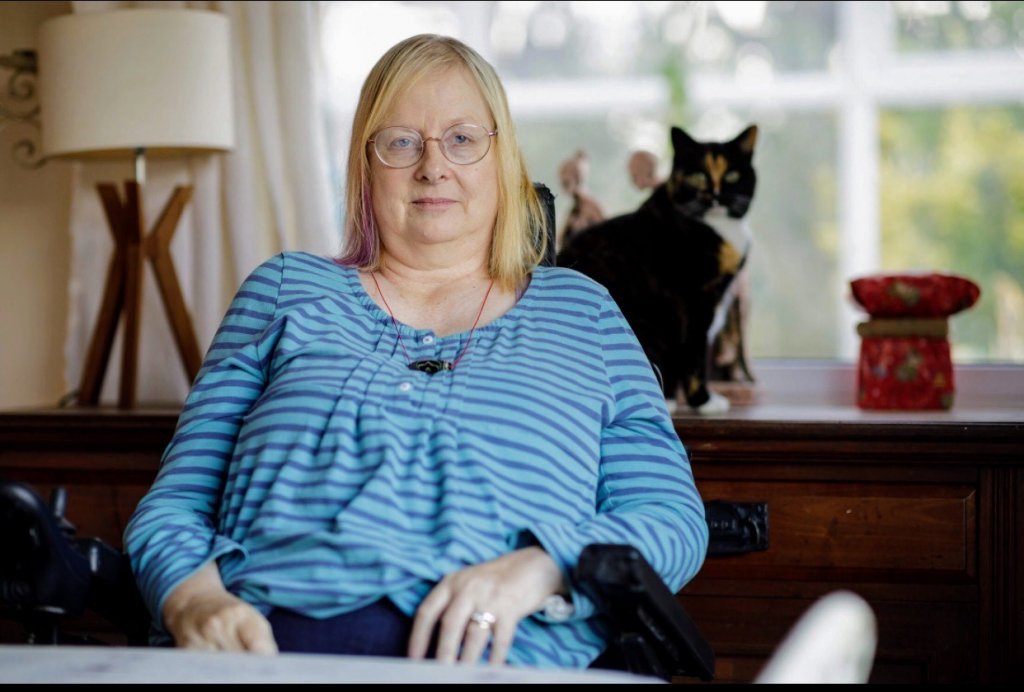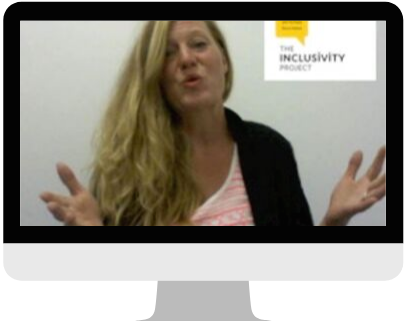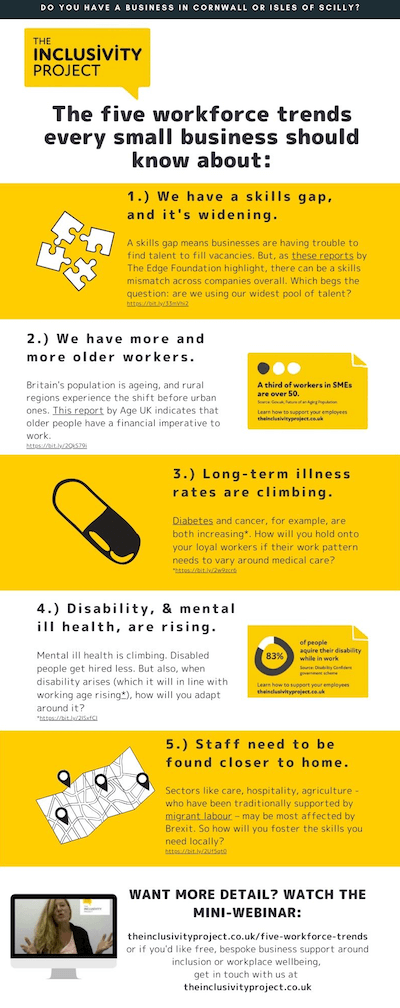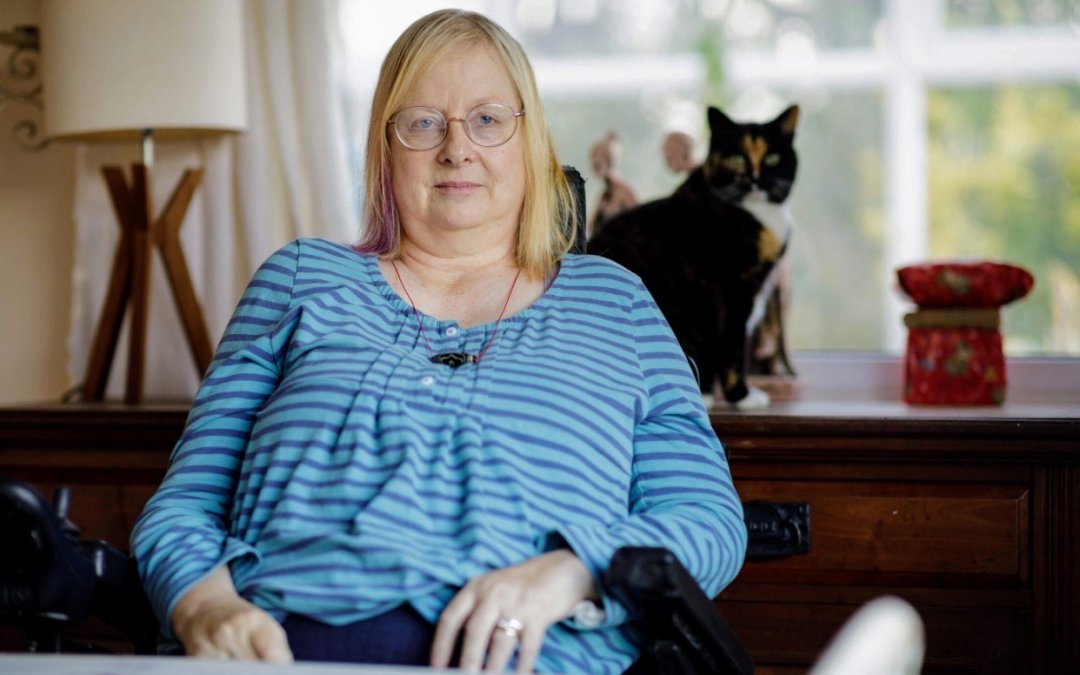The Inclusivity Project’s academic, Esmaeil Khedmati-Morasae, lent weight to a survey by disAbility Cornwall of 83 of its members, about how lockdown has affected them. The report, which heard harrowing stories from people who were anxious, left without their day-to-day medical care, unable to obtain testing or PPE, lacking access to basic food supplies and in some cases struggling financially to cover basic utilities, was summarised by University of Exeter, and then was submitted along with recommendations to a parliamentary committee.
The issue is now being aired by major local news channels including BBC Spotlight (around 3 mins into this clip), and Business Cornwall.
Steve Paget, President of disAbility Cornwall, said he felt that new legislation and isolation of disabled people and people with long-term health conditions had “set back disabled people by 50 years” in terms of equality in society.
Read the full press release here.
Read the full rapid assessment survey report here.

Sharon Kilty was one of the survey respondees. She works from home running an online forum for a national arthritis organisation. A wheelchair-user, she herself has coped better than many of the survey’s respondents, but it still hasn’t been easy.
One of the biggest things that disabled people have had to cope with, is weighing up the risks of having a personal care assistant coming to and from their home versus the need for care services, and for many respondents in the survey, this has meant going it alone.
Sharon ordinarily depends upon a personal care assistant to help her with getting up, getting dressed, preparing her meals, and more. But personal care assistants are typically employed by several different disabled people, and when Sharon found out that another of her care assistant’s clients had travelled to London shortly before lockdown, she felt that keeping her care assistant coming to and from her home while mingling with others was magnifying her risk of contracting coronavirus. During lockdown, Sharon has had to ask her husband to take over her care – although he himself is 83 years old. “We have managed, but it’s not sustainable.”, she says. “I feel awful when I look at the state of the house.”
Another issue highlighted in the report is that at least 20% of respondents felt that they did not have access to the correct information, and that information was not always in a format adapted to varying sensory needs and digital access.
Sharon says she did receive a shielding letter, but that the criteria for who qualified as vulnerable and needed to shield seemed to shift during the lockdown. “It wasn’t clear what I should do when I received the letter. It took me a while to realise I had to somehow register, and that might qualify me for delivery slots at the supermarket and so on. I couldn’t figure out how you got deliveries.”
One of the most frequent issues raised concerned the lack of access to healthy, affordable food; this included being overlooked within the Government (shielding) list of vulnerable individuals, and therefore lacking priority access to online supermarket deliveries. Even when listed, some noted challenges in accessing online food shopping, particularly without the support of personal care assistants.
In the absence of clear guidance around shopping, Sharon and her husband were forced to put themselves at risk by doing click and collect. She she had to personally drive to the supermarket, because her car can’t be driven by a non-wheelchair user. Her husband was a passenger and they both wore rubber gloves and masks that they’d had leftover for years from her daughter’s past trip to Thailand, where they are worn to help with air pollution. They lowered the wheelchair ramp on the car and, loaded the shopping in that way.
After shopping, they brought the groceries into the porch, unwrapped everything, put her husband’s clothes in the wash, and him straight in the shower. “It may have been extreme compared to what others were doing, but nobody told us what we needed to do, and I have a nursing background so that was my idea of how to make the shopping safe.”
Although Sharon and her husband have reduced their lifestyle to “just doing the basics”, with continued shielding they have no end in sight to their isolation, and their situation is not sustainable. Meanwhile, other respondents to the survey are in need of help as a matter of urgency.
As much of the country begins to come out of lockdown, and we start to incorporate people with different levels of risk from Covid-19 back into work, we need an integrated approach to co-ordinating the next phase, which must surely include consultation with those who are most isolated to ensure they do not become even more marginalised.
Several months ago, we were looking at closing the employment gap for disabled people, and people with long-term health conditions. They will not be able to even consider work if their essential care and basic survival is such a pressing priority, and be further denied their access to a livelihood.
Read the full text of the press release below:
Cornish charity exposes Governmental failure to support the most vulnerable
A rapid assessment of COVID-19 implications for disabled people in Cornwall has illustrated a failure by central government to support people who are the most vulnerable and adversely affected by the pandemic. It highlights how the government’s failure to act has devalued and pushed disabled people further to the margins and placed them at greater risk.
disAbility Cornwall & Isles of Scilly, a user-led disabled people’s organisation, acted on concerns for their stakeholders upon the Covid-19 Act suspending the Care Act, (which helps to improve people’s independence and wellbeing), as well as hearing of the daily struggles many were facing with employing care staff, accessing information and PPE, obtaining fresh food, challenges to their ability to maintain wellness and more.
They released an online survey across county asking about Covid related self-isolation practices, access to PPE, employment of personal care assistants, life changes and key hopes and concerns for the near future, to which 83 people responded.
One respondent said: “Personally I have not been supported by charities in my local community, despite the fact of living alone. There are many like me, that’s fallen through the cracks, we are really socially isolated due to our complex health conditions, but even more so now”.
Sharon Kilty, a wheelchair-user who responded to the survey, said: “As usual I feel invisible when it comes to the government handling this situation. We are just not on the list! I don’t know what we have to do to be seen and treated as an equal part of society. We have to get on and manage things for ourselves as best we can.”
The Charity called on the assistance of partners in The Inclusivity Project, an ERDF-funded initiative led by the University of Exeter, to summarise the findings to ensure the voices of the most vulnerable is heard at national level. The results have since been submitted through a call for evidence by the Women & Equalities Parliamentary Committee in central government.
The report highlighted a number of pertinent and highly significant livelihood, social care and support needs that are not currently being met. Disabled people left with no access to family care, financial support or technological assistance are at particular risk alongside families dealing with multiple health conditions and livelihood changes.
Jane Johnson, Chief Executive of disAbility Cornwall said: “The lack of timely information and support, lack of Covid testing for care staff, and poor provision of inclusive information has caused considerable fear and confusion for many. Some people’s stories are truly heart-breaking, more can and should be done now to alleviate further suffering. The most vulnerable people at this time can see no end to the current crisis for them. When we hear things like ‘thoughts of self-harming due to isolation from family, anxiety and basic livelihood needs not being met’, we must act.”
Esmaeil Khedmati-Morasae, University of Exeter researcher from The Inclusivity Project, who summarised the survey said: “A few months ago, The Inclusivity Project was aiming to help close the employment gap from the employer side. The assumptionwas that, if we could identify the policies that would positively influence the employment system (for example – more remote working, or ironing out unintended discrimination in recruitment processes) that equality wasn’t far off. This survey shows a worrying backward trend as disabled people, and people with long-term illness, become even more isolated and unseen, and their increased vulnerability to coronavirus makes them even more off the radar for their community, let alone employers. They are being devalued further in terms of their participation and contribution to society.”
The recommendations in the report call for immediate action on the following to improve the situation:
- Ensuring a more comprehensive Government approach to identifying and notifying (in writing) disabled people and carers with overlooked shielding needs;
- Communicating these needs to supermarket and other food providers, along with pharmacies, to ensure timely and regular access to food and medicine deliveries;
- Introducing flexibility in the spending of Direct Payments to ensure care and livelihood needs can be met in these unprecedented times;
- Providing necessary PPE and COVID-19 testing for all key workers (including personal care assistants and formal/informal care workers);
- Ensuring key workers with existing health conditions or new household care responsibilities are supported by employers to self-isolate without detrimental financial repercussions;
- Mainstreaming more inclusive forms of information provision and communication that do not presume universal access to Information Technology (IT);
- Providing access to online/phone counselling and health support for self-isolating individuals with specific health needs and family members with increased care responsibilities;
- Collaborating with the disability community to produce and share a clear plan for how the needs and priorities of disabled people will be respected and met as lockdown restrictions are eased;
- Ensuring the changes introduced by the Covid-19 Act to social care needs assessment and provision processes are reversed as soon as possible and do not continue to infringe upon the human rights and wellbeing needs of disabled people.
- Considering the many interdependencies between health and social care systems, and the many uncertainties and emergent outcomes of the COVID-19 pandemic, adopting a complex system approach to policy that joins up many laudable interventions and responses across these sectors could be a valuable way forward.
Have you already signed up to our newsletter…?

When you sign up, you get a free exclusive 10-minute video training, The Five Workforce Trends Every Small Business Should Know About, as well as getting a summary of the same info in time-saving, easy-to-digest infographic format.

You’ll also hear about all opportunities to get business support if you’re in Cornwall or Isles of Scilly, and to be the first to hear about the research that comes out of The Inclusivity Project.


Recent Comments